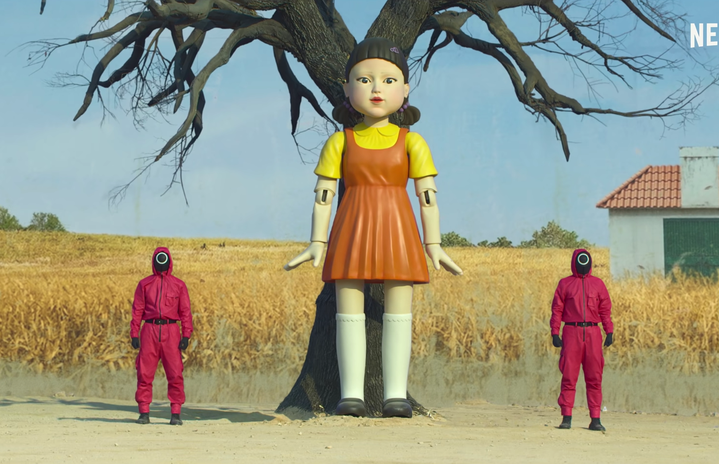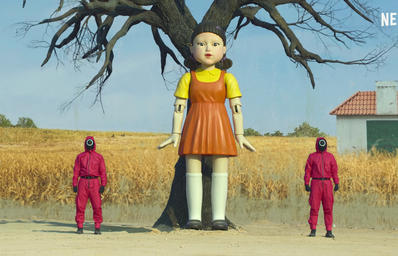Whether you’ve binged the show or ignored the countless posts on social media surrounding it, you’ve definitely heard the hype around Netflix’s “Squid Game.” The dystopian drama has a simple premise: People can compete in children’s games for money. As innocent as it sounds, the show takes a dark twist once players learn that they’re fighting for their lives within these games. While the show might seem like a horrific cautionary tale about accepting offers from strangers, it is ultimately a reflection of class struggle and life under global capitalism. Rather than create an alternate world that viewers can draw comparisons from, “Squid Game” can be seen as a direct reflection of our reality.
Players
The best way to understand the messaging behind the show is to look at the players’ motives. The lead, Seong Gi-Hun, joins the competition to help pay for his mother’s medical treatment. Ali Abdul, a migrant worker, joins the game to support his family because his job withheld six months’ worth of paychecks and failed to provide monetary compensation for an accident at his job. The game’s leaders explicitly state that they target contestants who need money due to outstanding debts or their proximity to poverty. Yet, the contestants’ experiences are not unique or rare. The stories of Gi-Hun and Abdul are the realities of many across the world. According to the CEO of GoFundMe, a fundraising platform, 1/3 of the donations within the website are given to health-care-related causes. While the pandemic exacerbated the number of American citizens with health care expenses, the trend of uninsured U.S citizens has been increasing for the past four years. According to a Gallup study, 13.7% of adults within the U.S. have no access to medical care. In other words, 13.7% of adults in the U.S. could face the reality that Gi-hun faced. Abdul represents migrant workers, regardless of geographic location, who often face targeting and economic suppression because of their status within their country of work.
Viewers can empathize more with characters not because they are people down on their luck, but because we know that these are ordinary people in real-world situations. The anxieties that debt, poverty and capitalism hold over people’s heads is common and ever-present within most of our
lives. “Squid Game” forces viewers to confront this reality through a dramatized life-or-death situation, yet the core is realistic.
Structure
The game is managed by anonymous, English-speaking wealthy VIPs that represent the structure of capitalism. As the host explained, the game was created because rich VIPs were bored. Essentially, they view poor people as disposable objects that are quite literally reduced to a couple of stacks of dollar bills that fill a piggy bank. Despite the sadistic nature of seeing people die and betting on their lives, the elites believe nothing is wrong because the game is fair. The game has a set of rules, including the ability to terminate the game if the majority of players choose so. While the illusion of free will is given, it’s clear that the games revolve around economic coercion to function. They have the golden piggy bank hanging over the players’ heads while
they sleep, eat or vote. It is a constant reminder that the game could change the route of their lives. It is a way to show that whether players stay or leave, they will lose in one form or another. The majority of players that decided to terminate the game eventually return. The host uses this as an example to show how players willingly choose to participate in a game composed of death and money. Yet, there is no free will when hunger, debt and poverty are your reality.
This idea of fairness is echoed within promises of the American Dream. The idea stems from a system of meritocracy that promotes individualism and hard work as the key factors to economic success. In this system, if someone fails, it is because of their own inadequacy, rather than social factors that contribute or lead to issues. It is clear that the game promotes these ideals while not truly upholding them. In the games, characters are pitted against each other. Whether it be withholding food or not intervening during bouts of violence, the rulers in the game want to create tension to divide players, which effectively destroys the fairness of the game. Just like the American Dream, their realities are not based on true equity, but rather the appearance of equity for the VIP bidders.
Who wins?
“Squid Game” presents us with the reality that success within this game is impossible through the confines of the game. It is created in order to pit players against each other and destroy the possibility of organizing to unite and defeat the game. In the same vein, everyday people are constantly pitted against each other or against themselves within capitalist society. The show reveals that the true horror is how it rings true to the battles of people around the world. While it might not be a fight to the death, it is a fight against their right to live equitably and meet their basic needs.


